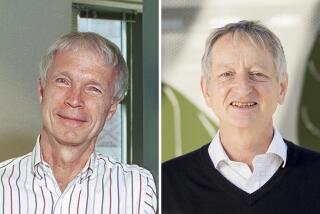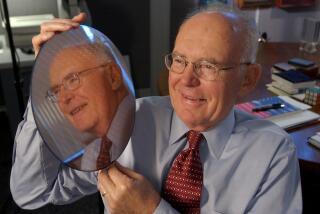Chip Inventor Wins Licensing
- Share via
Gilbert P. Hyatt, the reclusive La Palma inventor who won a 20-year legal fight in 1990 for a patent to prove that he invented the microprocessor that spawned the computer revolution, has signed his first patent license agreement with a major electronics company.
The agreement with a U.S. unit of Philips N.V. is significant because the Dutch electronics giant is the first company to acknowledge the validity of Hyatt’s patent by agreeing to pay him for the rights to use his inventions.
“(Hyatt) is a major inventor, and we think the amount of money that can be recovered in royalties by exploiting his patent portfolio could be over $100 million in the next 17 years,” said Paula Bernstein, a spokeswoman for North American Philips.
Hyatt said Philips has agreed to pay him an unspecified cash sum for the patent rights.
Since hitting the market two decades ago, microprocessors have become the heart of a wide range of electronics devices, from personal computers to microwave ovens. The thumbnail-sized silicon chips serve as a computer’s brain.
In the 1970s, credit for the invention went to researchers at Intel Corp. and Texas Instruments Inc., which both became leading electronics manufacturers.
But the U.S. Patent & Trademark Office shocked the industry in July, 1990, when it awarded the 53-year-old inventor a patent on basic microprocessor technology. Hyatt contended that a dispute with venture capitalists prevented him from exploiting the invention two decades ago.
Since the patent covers a product that has become so pervasive, analysts have speculated that even royalties amounting to less than 1% of industry revenue could bring Hyatt tens of millions of dollars.
Philips officials would not say whether the company will receive a percentage of future royalties from the Hyatt patents.
“It’s been a long time coming,” said Hyatt, who first applied for the patent in 1970. “It’s the culmination of a lot of work and a vindication of my efforts.”
Philips’ considerable financial and legal resources should help Hyatt in his efforts to secure license agreements from other electronics manufacturers, according to patent lawyers.
“We have conducted a thorough evaluation of Mr. Hyatt’s patents and have concluded that they represent valuable portfolios which are pertinent to a wide range of electronic products,” said Al Tamoshunas, corporate patent counsel for North American Philips, which had $6 billion in U.S. sales in 1990.
Altogether, Philips licensed 23 Hyatt patents relating to computers and liquid-crystal display screens, which are used widely in laptop computers. The patents, which include Hyatt’s microprocessor patent, cover computers used in a wide range of consumer products, the company said.
Many industry observers have been skeptical of Hyatt’s claims, because Texas Instruments claims that it invented the microprocessor before Hyatt and made it useful in applications, such as the pocket calculator.
Intel, based in Santa Clara, Calif., has declined to comment on the matter, but Marcian (Ted) Hoff, the former Intel researcher credited in the past with the invention, disputes Hyatt’s claims.
Terri West, a spokeswoman for Dallas-based Texas Instruments, said the company disputes the validity of Hyatt’s patent and is continuing its appeal with the U.S. Patent & Trademark Office.
More to Read
Inside the business of entertainment
The Wide Shot brings you news, analysis and insights on everything from streaming wars to production — and what it all means for the future.
You may occasionally receive promotional content from the Los Angeles Times.










